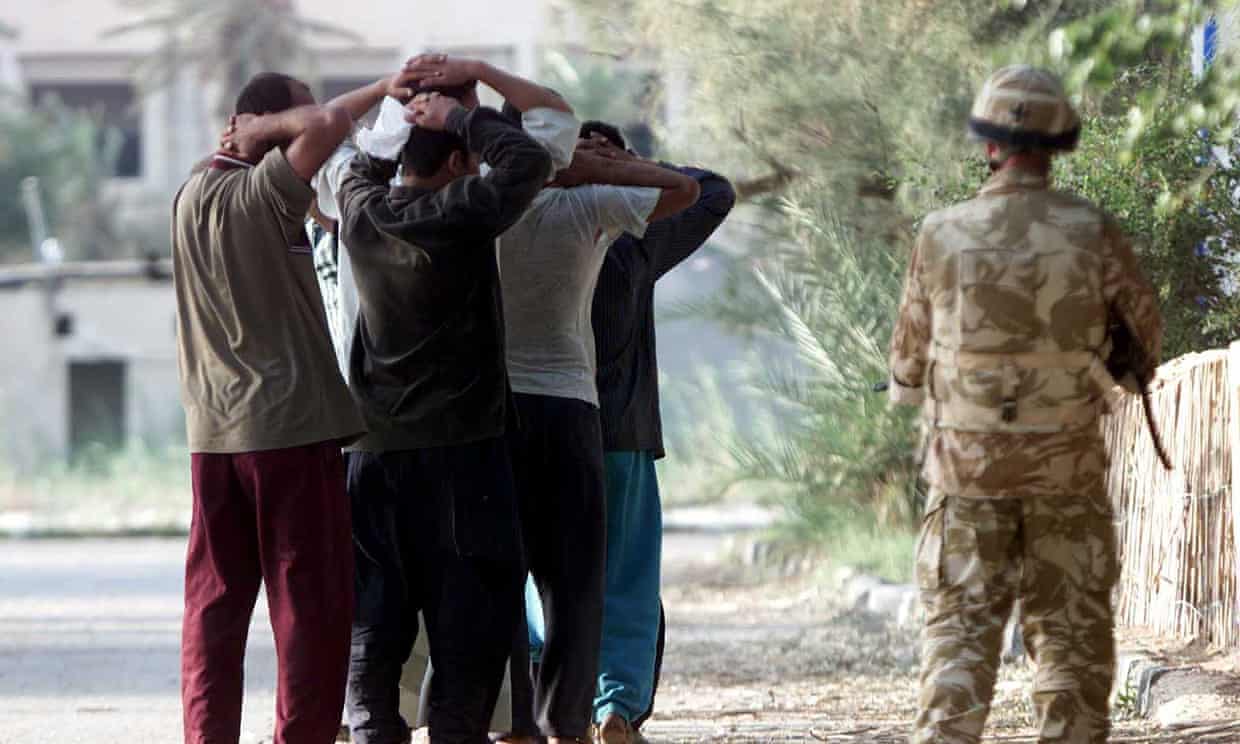 British soldiers guard prisoners in southern Iraq in 2003. The high court awarded four men £84,000 in compensation. Photograph: Reuters
British soldiers guard prisoners in southern Iraq in 2003. The high court awarded four men £84,000 in compensation. Photograph: ReutersBritish troops breached Geneva conventions in Iraq, high court rules
Court says soldiers subjected civilians to cruel and inhuman treatment, in cases that may determine handling of further claims
British troops breached the Geneva conventions and subjected Iraqi civilians to cruel and inhuman treatment by hooding them and taking turns to run over their backs, the high court has ruled.
Furthermore, the Ministry of Defence (MoD) breached the conventions as well as the 1998 Human Rights Act in the way in which it detained civilians after the 2003 invasion, the court concluded on Thursday.
The judgment comes 10 days after the international criminal court (ICC) declared there was “a reasonable basis” to conclude that British troops committed war crimes against Iraqi detainees.
The latest verdict was handed down after two high court civil trials in which four Iraqis claimed they had been subjected to unlawful detention and abuse by British forces.
While there had been reasonable suspicion, which justified their initial capture, Mr Justice Leggatt said “none of the claimants was engaged in terrorist activity or posed any threat to the security of Iraq”.
The claims are being seen as test cases that may determine how a further 628 claims are dealt with by the MoD.
In addition, 331 claims have been settled out of court, with the MoD paying out £22m as of the end of 2016.
They were brought at a time of sustained complaints at Westminster and in sections of the press that Iraqis bringing claims against British troops were essentially dishonest and represented by “ambulance-chasing” lawyers.
Sapna Malik, a partner at the London law firm Leigh Day, which represented the four men, said: “These trials took place against an onslaught of political, military and media slurs of Iraqis bringing spurious claims, and strident criticism of us, as lawyers, representing them
“Yet we have just witnessed the rule of law in action. Our clients are grateful that the judge approached their claims without any preconception or presumption that allegations of misconduct by British soldiers are inherently unlikely to be true.
“Our clients’ evidence has been tested at length in court and the Ministry of Defence has been found wanting.”
An MoD spokesperson said: “Our military personnel served with great courage in Iraq, often working under extremely difficult circumstances. We note the court’s ruling that these four detainees were not treated as they should have been, and are studying the judgment.”
Leggatt concluded that British troops had run over the backs of a number of detainees and the assaults “involved the gratuitous infliction of pain and humiliation for the amusement of those who perpetrated them”.
They constituted inhuman and degrading treatment and “a clear breach of the Geneva conventions”, he said.
The evidence of a former army officer, who said it would be impossible for such misconduct to be kept secret and not investigated by the army, appeared to “rest on nothing more solid than understandable professional pride and a measure of wishful thinking”.
Leggatt found that some of the evidence of one claimant was false or exaggerated, but other parts were not. The individual had been subjected to sleep deprivation and periods of complete deprivation of sight and hearing.
The court also found that two of the claimants, Iraqi merchant seamen who had been detained at sea, had been subjected to forced nudity and sexual humiliation, and one was burned on the buttock with a cigarette.
The two men could not prove they were in British hands at the time, rather than in US custody. However, the court concluded that one of the men was hooded and assaulted while in British custody.
Leggatt said the practice of hooding detainees was not only calculated to make them feel more vulnerable, but “by dehumanising them and giving their captors a cloak of invisibility”, it increased the chances that they would be assaulted.
The four men were awarded a total of £84,000 in compensation.
The court also ruled that the MoD’s policy of detaining individuals as prisoners of war unless it was certain they were civilians, rather than releasing them when there was no proof they were combatants, was based on a misunderstanding of the Geneva conventions.
Despite the court’s findings, the MoD said no service personnel or veterans had been interviewed by investigators, nobody had been charged with any offence and no criminal charges may ever be brought in the UK.
However, Fatou Bensouda, the ICC chief prosecutor, said last week that while there is no evidence British troops committed war crimes on the battlefield, some may have done so in the way they treated prisoners.
As a consequence, the court in The Hague is to press on with its investigations
The views expressed in this article are the sole responsibility of the author and do not necessarily reflect those of the Blog!














No comments:
Post a Comment